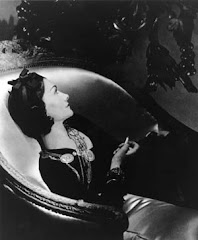I was halfway through a very interesting and detailed account in the Guardian of why couture is not subject to the credit crunch when, scrolling back to see if it had been written by Jess Cartner-Morley, the fashion editor, or Hadley Freeman, her deputy, I realised that it had been written by neither, but the paper's economics editor, who they'd send over to Paris for the shows. Fact fact fact fact.
Tim Jackson, principal lecturer at the London School of Fashion, says that the last big shock to luxury brands came after 9/11, because people stopped travelling, and a large proportion of luxury goods are bought by the well-off on their travels. There was, he says, a deliberate attempt to broaden the appeal of brands, with the sale of bags, jewellery and shoes that, while still expensive, were more affordable. "These goods have no issues with what's fashionable or size, and the goods have a high mark-up. There is a huge increase in directly operated stores, but they need high turnover to pay the overheads on the stores." Jackson says it will be this bit of the market - not the more exclusive haute couture niche - that will be affected by the credit crunch. The lay-offs in the financial sector, falling property prices and higher inflation are all likely to have an impact.
In Paris earlier, Sassi made the same point. "The issue is not the super-rich, some of whom are doing well out of the crisis, but the people below the super-rich. Haute couture will last for ever. It will only die when there are no ladies who are interested in beauty or feeling unique, or exclusivity."
While this helps explain the durability of haute couture, it doesn't quite explain why business has been so good in recent years. There are, however, solid economic reasons for the upturn. One factor is that the rich keep getting richer, and there are more of them. The compression of incomes seen in the decades after the second world war has been reversed; in Britain, for example, the gap between rich and poor has widened over the past decade, largely as a result of the salaries for the top 0.5% of earners.
Nick Tucker, market leader for the UK and Ireland at Merrill Lynch Global Wealth Management, said last week: "Spending by high net worth individuals [HNWIs] and ultra-high net worth individuals [UHNWIs] remains robust. The ongoing strength in both the global art market and luxury industries highlights that the wealthy will continue to spend despite clearly worsening economic conditions and explains why, historically, these industries weather global downturns."
According to a report by Merrill Lynch and Capgemini last month, there are now just over 10 million HNWIs in the world with a total wealth of $40 trillion. To qualify, you have to have net assets - excluding the value of your home - of $4m. Qualifying as an UHNWI is tougher; there are 100,000 globally with net assets of $30m or more.


3 comments:
All I can say to this is 'twas ever thus'. When I started my degree in Fashion Textiles with Business Studies in 1989 we were told exactly the same. The only difference now is that it is blamed on 9/11.
Tim Jackson is my colleague at the London COLLEGE of Fashion, and is a force to be reckoned with.
There is another category below the top two that needs to be mentioned: the Mass Affluent, that is, households with liquid assets of $100,000 US to $1 Million US. IMO these people, of which there are 33 million in the US alone, are the real drivers of fashion. There people re not upper middle class, they are above Upper Middle Class, and below High Net Worth. They are very common in my State (Massachusetts) and are my neighbors, family and friends (alas, not me, I am merely upper middle class) They are also not not necessarily CEO’s or hedge fund managers either; they work in real estate, trades, they own small business likes gas stations or franchises, they can even be in academia. Wikipedia has some really interesting statics on this demographic (just look up “Mass Affluent”.) I personally believe the Mass Affluent are the real consumer drivers behind fashion because they are the people who aspire to be HNW and UHNW.
In related news, the sky is still blue.
Did it really take an economics writer to point out that if rich people like it it will last?
Post a Comment